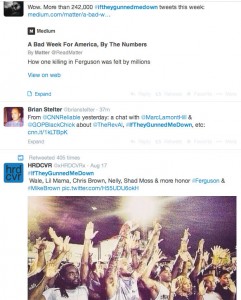
News of the events in Ferguson and discussions of racism and police militarization has been driven by Twitter, even more so than any other recent news outbreak. We get our news not from NBC, FOX, or CNN, but from the tweets, pictures, and videos from reporters and civilians on the ground in Ferguson.
This fusion of social media activism – things like the chilling #IfTheyGunnedMeDown – and Twitter-driven news is familiar, but not on this scale. We’ve seen it with Wendy Davis and the Occupy movement. We’ve had #bringbackourgirls and #yesallwomen. National news used to mock all this, but it is now driven by it. Many questioned or decried social media activism as slactivism, or said, as television show runner Shonda Rimes put it,#StopPretendingHashtagsAreTheSameAsDoingSomething.
These arguments are falling away, though. The internet is our most powerful tool now. Anyone can avoid CNN without a second thought – twitter news and activism inform and educate even the most uninvolved.
The situation is like something out of a dystopian novel, a story of over-militarized men with trigger-happy tear gas canisters (there are videos of kids being gassed) and an alarming willingness to threaten to shoot (Argus Radio’s Mustafa Hussein) and mace (Huff Post’s Amanda Terkel) reporters.
It would be difficult to believe if not for the tweets, the pictures, the videos, the vines. Articles are basically lists of tweets describing the scene(s). They’re shocking, but they paint a vivid picture of delicate situation mishandled by the roughest of hands. We have all this information because of the internet, and we have context because of the activism.
So often, these things peter out. We get distracted, we forget, and minimal change happens. Gun control regulations seemed inevitable in the wake of Newtown – that bill ended up getting shot down. An abortion bill ended up getting forced through in Texas despite Davis’ filibuster.
Thanks to social networks – and to both the reporters on the ground and the internet savvy in their homes – this is the greatest challenge yet to our attention spans. It’s fed not only by the developments in Ferguson, but the instances and videos of other police brutality against black males, most notably the chokehold death of Eric Holder.
Some authorities clearly just want this to go away – they hid the name of Wilson, inexplicably, for days. Perhaps this once, it won’t. Perhaps this is the day when Twitter’s power truly becomes a force. Perhaps we won’t simply see the individual perpetrators punished properly.
Maybe something – the racism, the militarization, the police brutality – will really, truly change. If not now, when? This situation is already ugly enough. If not even this can affect change, how ugly do things have to get?
For more information on the events in Ferguson, simply open twitter, where you can also find links to donate money for food to the protesters in Ferguson. And they said twitter activism could accomplish nothing.
